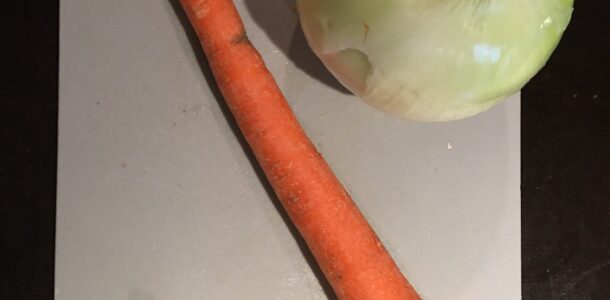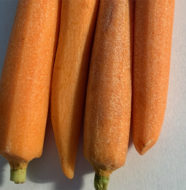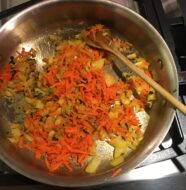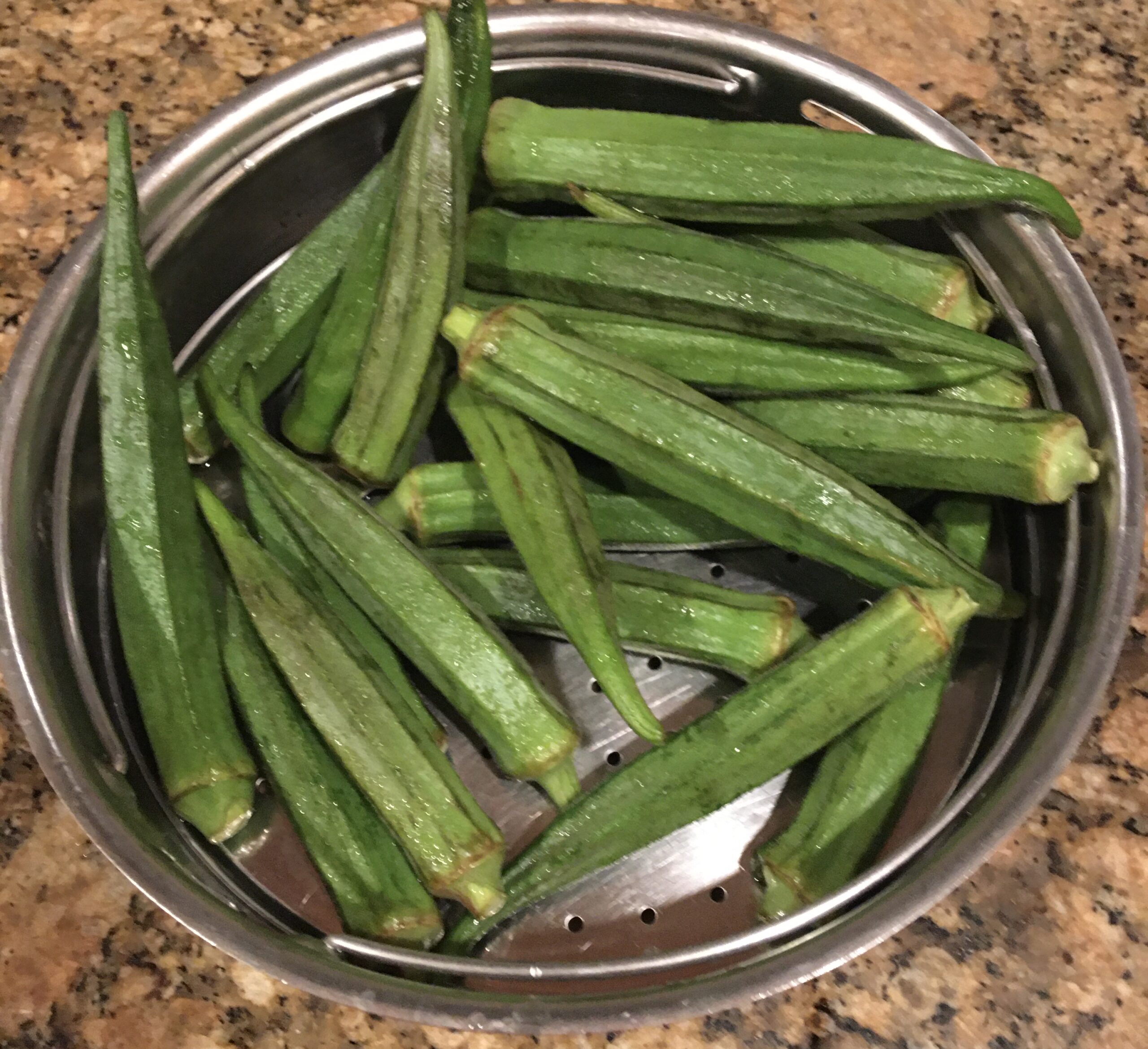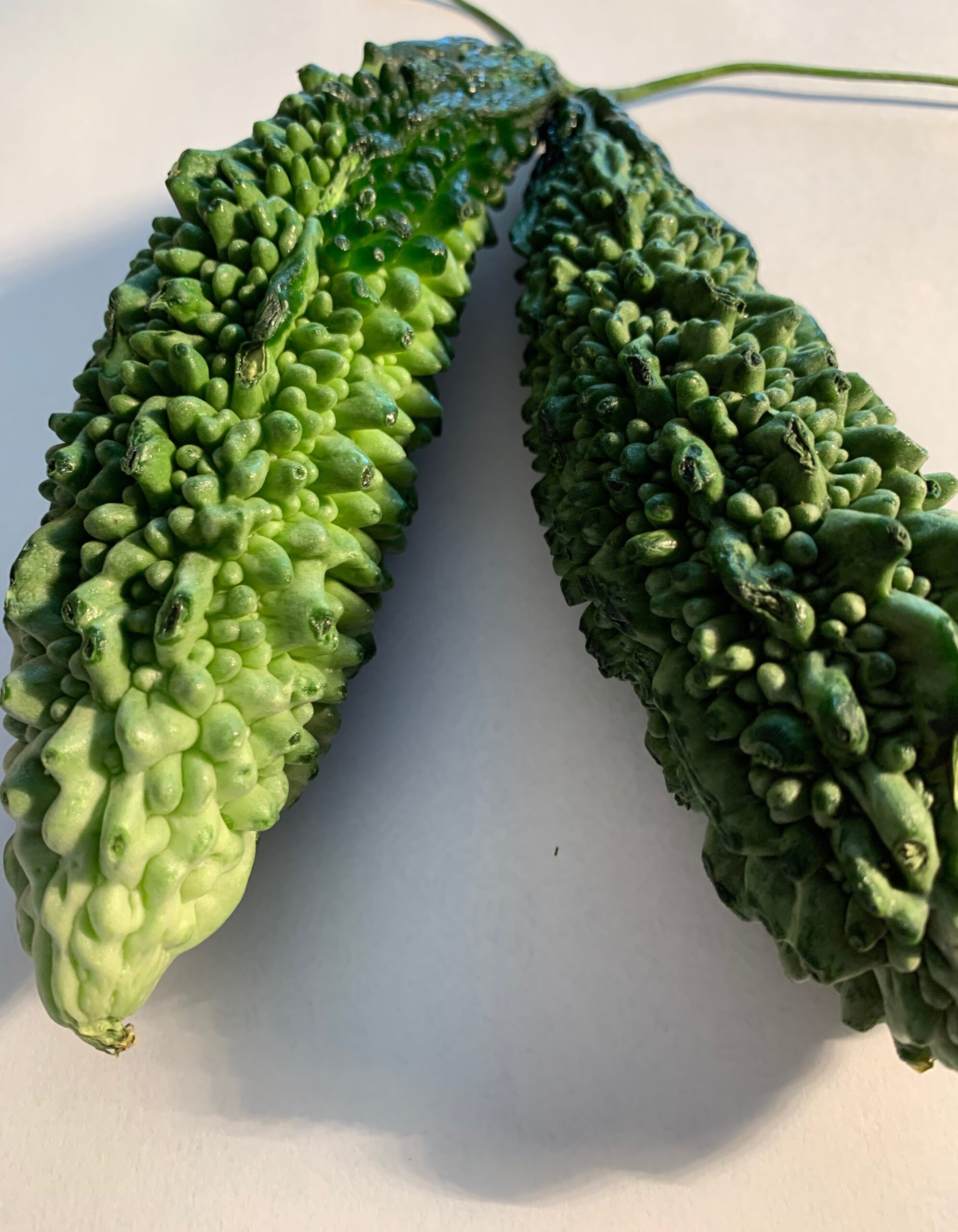Colorful carrots contain Beta Carotene & Lutein that might act as an antioxidant to help prevent cancer. They also contain fiber which might improve stomach and intestine conditions such as diarrhea or constipation. Carrots and other vegetables are always welcome in any form – raw or as in pickles that stay crisp when pickled. This pickle is a great vegetable supplement for picnics and sailing trips. In this pickle baby carrots, onions and peas are marinated in tomato puree, vinegar and oil with pickling spices. Poly acytalenes are the anticancer agents in carrot juicw
Buying & Storage: Look for tender, fresh baby carrots with a firm texture. Avoid soft flabby roots with surface cuts or mold. Large roots can be an indication of over maturity indicating poor eating quality. Carrots with leaves attached are great for baking and the ones with medium size for pickling or juicing. Exposure to sunlight will produce greenish coloration on the top end due to photo pigmentation that can diminish its sweet taste. Twisted or forked varieties are also not recommended.
Prior to storing wash thoroughly to remove any dirt and insecticide; snip the top greens and store in the vegetable compartment. Carrots stay well for 1-2 weeks. Set refrigerator temperature level below 35 degrees F and high humidity to maintain freshness.
Story: My co-worker teacher made this pickle in Nairobi Kenya when we went on a wildlife Safari to see gigantic elephants at the Tsavo National park with a group of children and parents for our field trip. It helped to include vegetables to our diet and provided Vitamin A.
Nutrition Facts of Carrot (Daucus carota) raw 100g
| GI =39 GL=3 | Minerals | Vitamins |
| Energy 41 cal (2%) | Sodium 69 mg (4.5%) | Folates 19 mcg (5%) |
| Carb 9.58g (7%) | Potassium 320mg (6.5%) | Niacin 0.983mg (6%) |
| Protein 0.93g (1.5%) | Calcium 33mg (3%) | Pantothenic acid 0.273 mg (5.5%) |
| Total Fat 0.24 g (1%) | Copper 0.045mg ( 5%) | Pyridoxine 0.138 mg (10%) |
| Cholesterol 0 mg (0%) | Iron 0.3mg (4%) | Riboflavin 0.058 mg (4%) |
| Dietary Fiber 2.8g (7%) | Magnesium 12mg (3%) | Thiamin 0.066mg (6%) |
| Carotene Alpha 3427 mcg | Manganese 0.143mg ( 6%) | Vitamin A 16706 IU(557%) |
| Carotene Beta 8285 mcg | Phosphorous 35mg (5%) | Vitamin 5.9mg (10%) |
| Crypto xanthinB 0 mcg | Selenium 0.1mcg (<1%) | Vitamin K 13.2 mcg ( 11%) |
| Lutein zea xanthin256 mcg | Zinc 0.24mg (2%) |
(Source: USDA National Nutrient data base)
Health Benefits of carrots
- Improves vision: Beta carotene present in carrots gets converted to vitamin A acceptable that can check tear and macular degeneration.
- Diminishes risk of cancer: carrot contains beta carotene a cell reinforcement; Falcarinol – a phytonutrient that advances colon well-being and decreases the danger of malignancies; bioflavonoids which can bring down the risk of tumors.
- Dental Health: Carrots contain minerals that forestall tooth harm. The crunchy carrots scratch off the plaque and nourishment particles sticking to the teeth, invigorates the gums, and causes salivation offsetting cavity-forming microbes.
- Relieves menstrual cramps and stomach problems: Eating raw carrots or drinking carrot juice causes one to feel less exhausted, being rich in iron and betacarotene.
Spice Power
- Red chili powder: a rich source of vitamin C that helps support the immune system and combat chronic diseases. Powerful antioxidants in red chili help clear blockages in arteries and veins.
- Cumin seeds: boost metabolism and improve digestion. They contain thymol known for stimulating the enzymes and enabling better digestive juice secretions. Cumin seeds flush out toxins from the body. A glass of cumin water consumed daily helps in regulating blood sugar levels, Cumin is anti-inflammatory and anti-bacterial which helps with acne reduction and for clear skin and loss of weight
- Fenugreek seeds: balance cholesterol, soothe upset stomachs, maintain blood sugar levels and liver and kidney health; reduce appetite, fat mass, fever, muscle pain, and menstrual cramps. They also enhance breast milk production in new mothers.
- Turmeric powder: Curcumin in turmeric helps reduce joint pain, support a healthy heart, and support the body against an overactive immune system. It also helps improve cognitive decline and improve mood and energy.
- Garlic pods: Garlic can combat sickness including the common cold, reduce blood pressure, and improve cholesterol levels which may lower the risk of heart disease.
- Curry leaves: help with weight loss and heal wounds with carbazole alkaloids; help treat dysentery, constipation, and diarrhea; relieve morning sickness and nausea; reduce blood glucose levels effectively; reduce stress; eliminate bacteria; good for eyes, improve hair growth and memory.
Method to make baby carrot pickle
- Peel carrots and onions; press frozen peas between paper towels to dry.
- Heat 2 tbsp. oil in a skillet until smoking.
- Deep fry vegetables, starting with onions, followed by carrots and peas.
- Drain the veggies on paper towels. Sprinkle a little salt.
- Heat the remaining oil in a thick-bottomed frying pan.
- Remove pan from heat. Add all the spices except salt.
- Return the pan to medium heat and stir.
- Add tomato puree, fried vegetables, remaining salt, and allow to cook.
- Pour in the vinegar and stir in the sugar, just before turning off the heat.
- Allow the pickle to cool without covering the pan.
- Spoon into sterilized bottles and allow them to marinate for 3 days.
Serve Subzi Aachar as a condiment with Quinoa, Rice, Pasta, Bread, Naan or Parathas.
Tips
The pickle should be bright red and covered in a thick layer of oil, to prevent spoiling
Peeled baby carrots and frozen whole baby onions can be used to save time
Baby Beetroots, Baby corn or Brussels sprouts can be substituted for pickling

